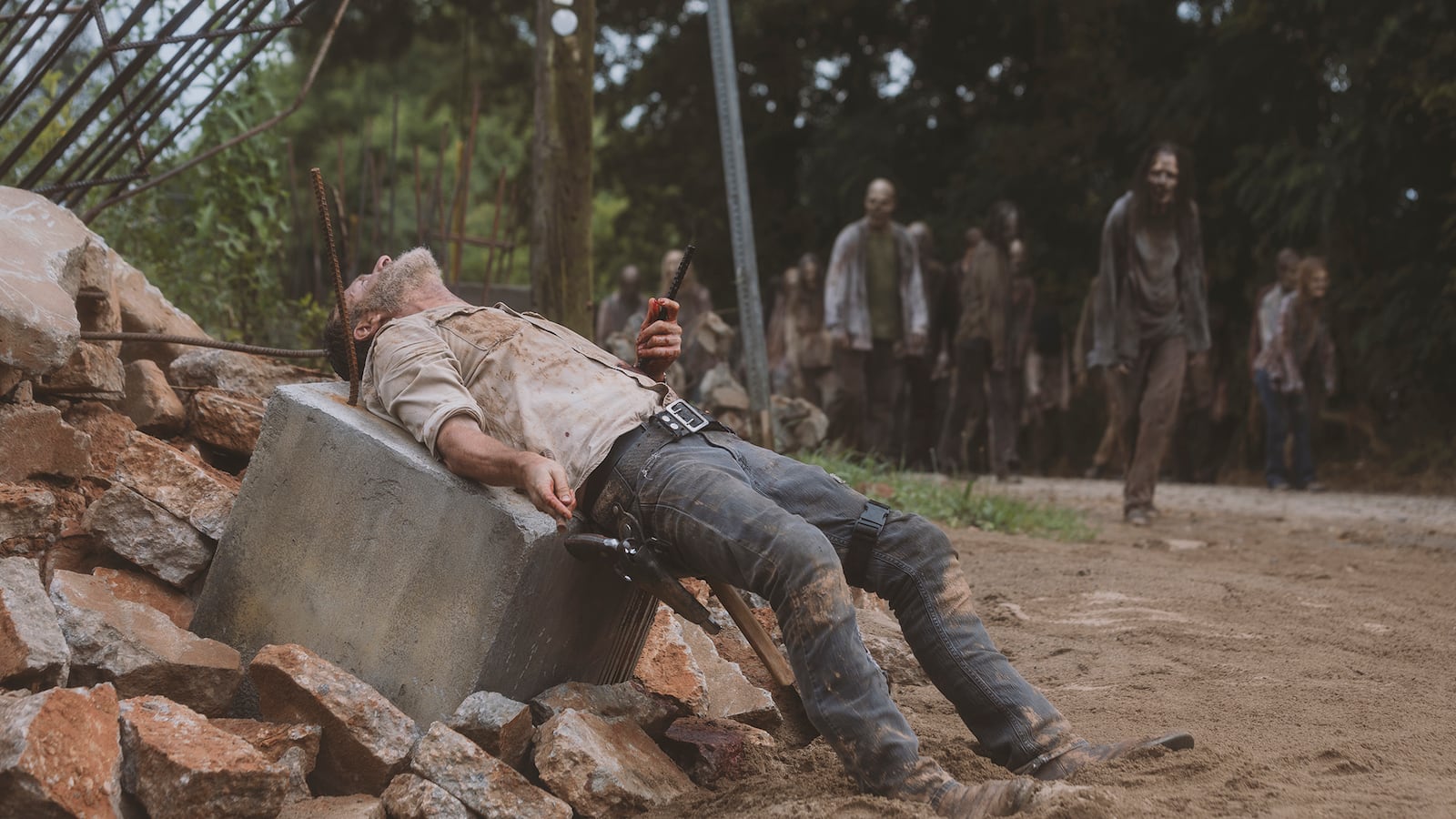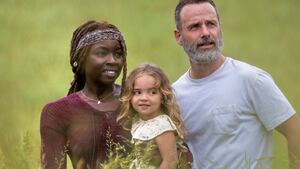Update: AMC announced Sunday night in the minutes after airing the episode it had hyped as The Walking Dead’s “farewell” to Rick Grimes that Andrew Lincoln will reprise the character in three TV movies. Their aim is to “expand the universe” and “show a whole different corner of the world,” according to Walking Dead EP Scott Gimple. Basically then, the disappointing lack of finality in this episode’s half-assed conclusion is only a ruse—a set-up for three films AMC describes as the “first projects” in a planned “Walking Dead Universe.” Isn’t corporate storytelling fun? Read on for our breakdown of the episode, viewed in the context of the show and the character it attempts to do justice to.
Rick Grimes is not dead, but he is gone—for now.
The final moments of “What Comes After,” the Walking Dead episode billed as series star Andrew Lincoln’s last, confirm that the tortured leader’s exit from the show is nowhere near as final as death. He could return from the far-off community Anne’s helicopter contact whisks him off to, a place where she says people have lives “like you can’t imagine.” Or we might never see him again. We only know that years pass without him, long enough for his little girl to grow up and begin living up to his legacy, helping those in need. It’s a lovely moment (Judith’s adorable in that hat), yet maddening for how it sours an otherwise moving, emotional hour with a cliffhanger that shifts focus from Rick Grimes to a mystery about people with helicopters.
The helicopters are cool, sure, and the questions they pose—like, what sort of place on this zombie-ravaged earth could possibly sustain them? Or what the hell is an “A” and a “B”? And what are they doing with the people Anne hands them?—are certainly intriguing. But as the final gut-punch in an episode that so effectively plumbs the depths of Rick’s soul, those questions feel silly and tangential at best. If the episode had shed more light on the helicopter mystery, rather than using Rick’s departure to prolong it, maybe the former wouldn’t have undercut the gravitas of the latter. But as it stands, the tone of this monumental episode’s conclusion feels needlessly dissatisfying.
Of course, real closure is a luxury rarely granted on The Walking Dead. (Just ask Maggie, who scornfully reminds Michonne that she never said goodbye to Glenn.) Rick Grimes’ departure is no exception. But the minutes that precede his helicopter ride into Valhalla do form a touching tribute to the character, paralleling striking moments from his immaculate first outing in the pilot and digging into the many personas Lincoln has so gamely embodied over eight years: Rick the murderer. Rick the pacifist. Rick the fascistic dictator. Rick the messianic savior. Rick the do-gooder family man. Rick, buckling under the weight of the past. Apart from the oddness of this episode’s ending, it all makes for the most thoughtful hour yet in a season that, so far, explores the messy nuances of governing and relationships—a welcome change from the show’s go-to structure of good guys vs. bad guys.
Departed characters return in hallucinations to talk a wounded Rick—impaled after his literal and symbolic fall off a white horse—through his guilt. The result is an odyssey through Rick’s memories, his dreams, and his trauma. Jon Bernthal, Scott Wilson, and Sonequa Martin-Green (Wilson, who passed away last month, in what appears to be his final screen performance) reprise their roles as Shane, Hershel, and Sasha, respectively. Lincoln, as always, knocks it out of the park. He’s especially sharp opposite Bernthal again, with Rick and Shane’s tense, brotherly dynamic as compelling as it was six years ago. The two ex-cops share lunch in their old squad car, reminisce, and trade barbs (“You mean my baby girl,” Shane quips about Judith). Their exchange highlights how killing Shane changed Rick, and the savagery he’s been capable of ever since: hacking men to death in a church, for instance, or biting someone’s throat out.
As Rick pulls himself back onto his horse and fades in and out of consciousness, different voices echo a line of Morgan’s from the pilot, delivered when the two first met: “What’s your wound?” At the time, Morgan was asking whether Rick had been bit. Here, the line can be read more metaphorically, as we revisit Rick’s doubts and fears. “I’m tired,” he tells Hershel, beside himself with guilt for everything Maggie’s endured since they met. With Sasha, Rick goes full Tony Stark in Age of Ultron and sees everyone he’s ever felt responsible for dead. (The moment’s introduced with a nice nod to the pilot’s iconic “Don’t Open, Dead Inside” doors, this time with the “Don’t” scratched out and “Outside” replacing “Inside.”) Both Hershel and Sasha assure Rick that his vision of goodness in the world can prevail. That idea manifests physically in the symbol Rick’s fought for all season, the bridge, and verbally in another line repeated throughout the episode: “We don’t die.”
That line, of course, carries double meaning: without their brains bashed out, people literally no longer “die.” But it also refers to the ideals we pass down, to legacy, and to the ways we change the people around us. When Rick, pursued by a sprawling zombie horde, hobbles toward the bridge his people have spent all season erecting, it’s heartbreaking not because we know it will likely collapse—but because we understand that this is Rick giving up on the peaceful, civilized future Carl convinced him to fight for.
But a funny thing happens then: the bridge holds. The thing actually stands firm long enough for Rick to fade into another dream, in which he realizes the family he’s been tempted to search for on the other side (Lori and Carl) are just as bound to him as his living family: Michonne, Judith, Maggie, Daryl, Carol, and the others. The hallucination gives him the strength to wake up and take aim at a bundle of dynamite, just in time for everyone in the dream to show up for real and watch Rick blow the bridge—and seemingly himself—into oblivion. It’s a particularly sad moment because of how urgently and capably the others organized to save him. But Michonne’s heroic race through the woods to reach Rick ends in screams and tears.
Maggie’s decision earlier in the episode to spare Negan might have shocked Rick as much as the bridge did. Jeffrey Dean Morgan turns in his best performance by far as Negan, reducing his swaggering, shit-talking cartoon villain to a blubbering tangle of guilt and vulnerability. Hearing that his bat (named after his late “angel” of a wife who died of cancer) was left abandoned on the battlefield seems to have broken Negan. He begs Maggie to kill him so he can just be with Lucille, the woman who “deserved better than she got”—certainly in her choice of husband. Armed with a crowbar, Maggie refuses him the mercy he wants. She condemns him to rot in prison instead, telling him, “You’re already worse than dead.”
Again, it’s all compelling, emotional stuff—which only makes that half-hearted ending all the more underwhelming. There’s nothing wrong with ambiguity. But without some sense of finality, this barely feels like an ending at all. (Next week’s episode, which I’ve seen, deals with the issue largely by avoiding it.) Still, the hour that precedes it is a worthy tribute to Lincoln’s work. The Walking Dead has not always deserved its insanely dedicated lead actor—the man will do anything from tearing into raw chicken meat to spending most of every year an ocean away from his family for this role—but does its damnedest to rise to this occasion. If only it stuck the landing.







